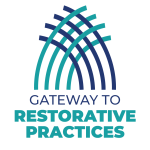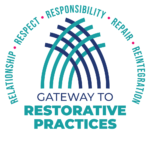During the first five years that I did Restorative Practices in schools trainings, much of my time was spent dispelling myths. Participants arrived at full-day seminars and workshops proudly ready to share their knowledge about RP. Unfortunately, most of their information was incorrect, but these participants were also operating at their school sites under the myths, further perpetuating inaccurate information.
Early Myths
Here are some common myths about Restorative Practices I heard regularly. Have you heard any of these?
- Restorative Practices are just some touchy-feely programs.
- Restorative Practices are just sitting in circles.
- There are no consequences with Restorative Practices.
- Restorative justice is soft. Students are not held accountable for their actions.

Some of my attempts at sharing accurate information were met with hostility. That struck me as odd. Participants attended trainings to learn about implementing Restorative Practices principles at their school sites but stood solidly by their myths.
Recently during a Restorative Practices 101 six-hour training I realized that many myths that were so hard core a few years ago are now reduced to three common myths. Occasionally I hear an outlier myth, but these three still stand strong.
Three Still Standing Restorative Practices Myths
Myth #1. Students Can’t be Suspended
After almost a decade of training, this is the most common myth I hear; it is still alive and well. I’m told over and over, “We can’t suspend students.”
I inquire, “Where did you learn that?” They usually can’t come up with an answer. I add, “Restorative Practices is not against suspensions. The program offers many alternatives to suspensions, but there are times when the offense is such that a suspension is the only consequence.
Also, if a student doesn’t want to participate in an alternative restorative conference, the administrator uses traditional punishment. This next myth ties closely to myth one.
Myth #2: Restorative Practices are Mandatory for Students
Early in the day of an all-day training, the trainers share ten principles of restorative practices. One of the principles is that restorative practices are voluntary.
A participant shares, “At our site, students are told that restorative practices are mandatory. They don’t have a choice. What you’re saying makes so much sense.”
I assure the participants that Restorative Practices provides an alternative to traditional punishment, but it doesn’t remove it from being an option. In circumstances, such as bullying, it might not be appropriate for the bullied student to meet face-to-face with the student who is being the bully. It may cause more harm. If the student isn’t willing to take responsibility for his/her behavior, Restorative Practices isn’t an option. Restorative Practices requires participant’s acceptance of personal responsibility.
In the case of restorative conferences in lieu of suspension, sometimes the parents/guardians refuse. At one school site a restorative conference was set up with all the participants. The morning of the conference the parents of the student harmed backed out saying, “I want the student punished.” Parents/guardians don’t get to dictate punishment, but they can choose not to participate. The impending restorative conference was cancelled.
Myth #3: Restorative Practices Takes Too Much Time
I can’t envision a day when I won’t hear this myth. This myth is typically used to disguise, “I don’t want to do this.” The excuse isn’t necessary since it is voluntary not only for students but for staff, teachers, and administrators. Of the 34 sites we work with, eight school sites chose not to meet with a Restorative Practices trainer for a fall update in 2022.
Anytime we learn something new, it takes longer in the beginning. But as educators begin using the skills, the interventions take less time and become integrated into daily routines.
However, restorative conferences do take way more time than saying, “You’re suspended for three days.” Restorative conferences are typically led by administrators who believe the time spent is investing in helping the student learn from the mistakes. The student is challenged to make things as right as possible for the person(s) the student harmed, restore the relationship(s) if possible, and move towards healing and a plan for changing behavior, which is always a win.
How to Address Myths
If you hear myths about Restorative Practices, Restorative Practices Partnership Denver offers a few ways to address myths at your site in their article, Myths About Restorative Practices and How to Address It.1
- Ensure that educators’ concerns about Restorative Practices can be voiced to a Restorative Practices expert who can help them dispel myths by responding with realities.
- If the goals of Restorative Practices become foggy, offer booster training periodically.
- When training on the levels of interventions used with students, be transparent about them when students are referred to the restorative practices process.
- From the beginning be very clear about the expectations of implementing Restorative Practices. Don’t present Restorative Practices as a cure-all to fix all the school’s problems. clarify the purposes and day-to-day realities of restorative practices implementation.
What Restorative Practices myths do you hear on your campus?
Sources:
- Myths About Restorative Practices and How to Address It. RPP (Restorative Practices Partnership) Denver. https://rjpartnership.org/wp-content/uploads/Myth-vs.-Reality-revised.pdf
- Image: Facts_Myths [commons.wikimedia.org]

